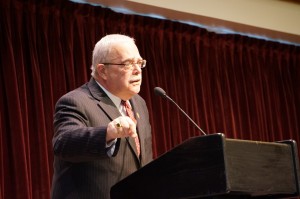 When Metro’s Silver Line project received approval for $1.9 billion in federal Transportation Infrastructure Finance and Innovation Act (TIFIA) loans last May, it seemed as though funding challenges for the line’s Phase 2 were solved.
When Metro’s Silver Line project received approval for $1.9 billion in federal Transportation Infrastructure Finance and Innovation Act (TIFIA) loans last May, it seemed as though funding challenges for the line’s Phase 2 were solved.
But that money may now be in jeopardy, and Rep. Gerry Connolly is urging his fellow Congressmen to act quickly to reach a solution.
The U.S. Department of Transportation has notified all states that restrictions will be placed on their federal highway funds starting Aug. 1 because the Highway Trust Fund, which funds the TIFIA loans, is bordering on bankruptcy. Some experts have estimated the fund needs an infusion of more than $6 billion to move forward.
“The urgency for Congress to address the shortfall in the Highway Trust Fund grows with each passing day,” Connolly said late last week. “Road, bridge, and eventually mass transit improvements in every state are at risk of grinding to a halt in a matter of weeks in the heart of the summer construction season unless we act responsibly to address this challenge.”
While Phase 1 of the $5.6 billion rail line — which is slated to open July 26 — received $900 million in federal funding, Phase 2 originally received none. Many observers, including citizen advocacy group Reston 2020, predicted a large spike in tolls to make up the difference.
Tolls have risen the last three years, but with TIFIA loans in place they would remain frozen for five years, MWAA officials said last spring. Phase 2 is also slated to receive $300 million from the Commonwealth of Virginia.
Phase 2 will run from Reston’s Wiehle Avenue to stations at Reston Parkway, Herndon, Route 28, Dulles International Airport and Ashburn. Phase 2 is scheduled to open in 2018.
The Silver Line’s $1.9 billion is to be largest loan in the TIFIA program’s history. Sen. Mark Warner said earlier this spring that the final approval is “great news for the future economic growth of Northern Virginia.”
The Highway Trust Fund is financed through the federal gas tax, which is currently 18.3 cents per gallon, but that surcharge has not been adjusted since 1993 and the tax has lost nearly 40 purchasing power. In recent years, Congress has had to transfer money from the General Fund to keep the Trust Fund solvent.
The U.S. Department of Transportation estimates Trust Fund expenses will exceed revenue starting in August. The nonpartisan Congressional Budget Office estimates the Trust Fund needs an infusion of $6.6 billion to meet its obligations through December.
In Virginia, nearly every mode of transportation will be negatively affected by the trust fund shortfall, said Connolly. Here are some of the other effects if the federal funds fall through, according to the Virginia Department of Transportation:
- 149 bridge replacements would be put on hold
- 175 aging buses and train cars would not be replaced
- 44 smaller transit systems would not be able to maintain service
- 350 other projects would grind to a halt
- 43,000 jobs would be lost
“Roads and bridges are crumbling in the commonwealth and in every other state,” said Connolly. “Our transportation network serves as the backbone of our economy, and it’s only a matter of time before that decay begins to negatively affect our communities and their economic competitiveness.”
Connolly recently cosponsored legislation with Rep. Chris Van Hollen (D- Maryland) to close an offshore corporate tax loophole to replenish the Trust Fund.







